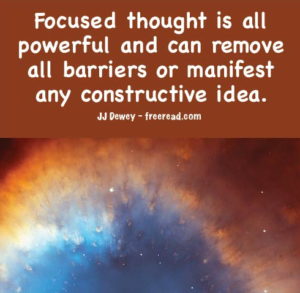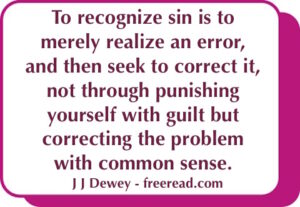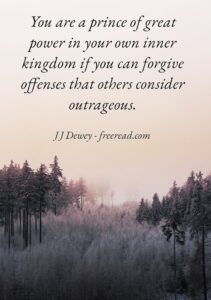
Keys to Manifesting
2021 Gathering, Part Thirty-Six
JJ: This is the way it is with reincarnation. We’re born with a fresh start with no memory we hated when we meet them again. We don’t remember that we hated them. We may have a vibe connected with them. You ever have that happen in this life? You meet somebody and you just get a warning vibe about them. Susan again, she’s always paying attention here. But anybody else? Anybody else got a warning vibe on anybody?
Rebecca: Yeah.
JJ: I’ve had people say they got warning vibes on me, so who knows? Yeah, I think it’s their imagination.
Ed: One way to meet that person again in the next life is to have strong emotions.
JJ: Yeah, right. It doesn’t matter if you have strong positive or negative Emotions.
Shawn: So what is the difference between having a thought with and without energy behind it?
JJ: Well, it’s the fact that just a thought by itself doesn’t seem to have much energy. I can create a thought like, “I want to build a business.” If it’s just a wishful thought, well, nothing’s going to happen because wishful thought doesn’t really create anything. But if you really think about it, “well, I would like to create a business and be my own boss; how do I go about doing it?” So you start to think about how this can be accomplished.
It’s not going to be accomplished just a passing thought. It has to be accomplished by an intelligent processing of thought and keeping the thought in your mind. Okay, “I want to be on my own and create my own business. How am I going to do that?” So you have to keep that in your mind, first of all.
And there’s all kinds of people who like to be in business for themselves, but it’s just a passing thought – goes right through them and so there’s not much energy behind it.
But then as they progress, what creates the energy is the concentration of the thought, the thought about, “well, you know, I’m going to make this a reality.” You keep thinking about it, and as you keep thinking about it, then you get ideas. Then you think about how to implement the ideas, and as you think about how they implement ideas, you have more thought and more energy following that thought until finally you start implementing those ideas on the physical plain, and they start manifesting.
Rebecca: Persistency is a big thing. Persisting thought, visualizing, imagining, but the biggest thing and I actually have to be super careful with this is, if you say it . . . for me, if I say it once, it will probably happen. But if you say it over and over, if you speak it, I mean, you’ve almost set in motion, and it can’t go back.
I have to be very careful even with saying like, “Oh, we travel all the time.” Because if I say that a couple times, all of a sudden, we have to start traveling all the time, even when I didn’t want to. And if I start say, “Oh, we never have to travel anymore.” All of a sudden, we never travel, we never get contracts, it just doesn’t materialize.
So I found that the word, you know, you can hang yourself by the tongue or you create by the word.
JJ: Yeah, creation is a combination of thought moving between male and female energies. The male energy radiates thought and the female energy receives it. There’s a lot of correspondence between the actual physical creation and what happens in real life. In physical creation, the male gives out millions of sperm and only one of them, if he’s lucky, makes it and impregnates a female. She rejects all the rest. She rejects almost everything the guy sends, but then every once in a while, she says, “that’s a good little sperm, I’m going to accept him.”
And that’s the way it is with male and female energy. The male comes up with all kinds of ideas. He says, “honey, I think we should do this.” And she says, “that would be nice,” you know, but she doesn’t really accept it 100%, and nothing happens. Then he says, “well, this would be nice.” And she thinks, “oh, yeah, so-so,” you know, and nothing happens. And then he says, “boy, wouldn’t it be nice if we’d go on a vacation to Hawaii,” and all of a sudden, her eyes light up and she thinks, “you know, that would be a good idea.”
And then the guy forgets that he said that, but not her. She’s accepted that thought in her womb, and it’s come to life and she’s not going to let it go.
A couple of weeks pass, she says, “honey, what have you done about our plans of going to Hawaii?”
He says, “what plans?”
“You know, what we talked about.”
“Oh, okay. well, you really want to go?”
“Yeah.”
“Okay. Well, we’ll see what we can do about putting away the money.”
And so he’s going to Hawaii whether he wants to or not, because she has accepted that into her womb. Have you guys noticed that about females, how the females will reject a lot of the stuff you come up with, but when they do accept something, I mean, then there’s no turning back.
Adam: Yes. It wasn’t actually Hawaii. It was, “wouldn’t it be nice to have sex on the beach?” And then she turns it into, “yeah, wouldn’t it be nice to go to Hawaii?” (laughter)
JJ:
That’s funny. That’s pretty good. I hope the recording got that.
That is an excellent point, Adam, with the male female relationship. Like the guy will say something in one direction and the female will hear it in the way she wants to hear it. But when that seed is planted, then there’s no turning back.
Now, my wife is a Capricorn and that’s symbolized by the mountain goat and when she gets something in her head, I mean, there’s just no turning around. I call her affectionately ‘my little mountain goat.’ Because, boy, once she gets something in her head she moves forward, and it’s not always planted by me.
She listens to all these medical seminars and stuff, and she’ll come up with a new supplement or something we’re supposed be taking, and she says, “you’re going to be taking this now.”
I say, “really, is this supposed to be good for me?”
“Yeah, you really need it.”
Rebecca: How do you change somebody that’s like, like how do you get them to go a new direction? Because we’re the reverse energy? He’s the female, I’m the male, and he is like Artie and once he’s going like, you can’t . . . we need to change directions. Like, how do you help?
JJ: Yeah, well, okay, take that takes the second key of judgment. You’ve going to use a lot of judgment. When it turns out you get something planted in the female that really begins to grow. I mean, it’s pretty rough. It takes an abortion, a thought abortion to change around that idea. Then if she does have an abortion, she won’t be happy with you for some period of time. So be pretty careful about aborting something that is implanted in the female mental, emotional womb because it is very powerful.
But on the other hand, it’s very useful information to know that if you are male and have a relationship with a female, somebody with strong female energy, you can plant something in them and make it materialize, and you can use this knowledge – could be a good key of knowledge even, well it’s connected to energy follows thought – but you can use this to accomplish almost anything.
Now it works with more than one female too. Bill Clinton was really good at planting ideas in females in mass because females really liked him. So he was able to plant ideas in them and that kept him in office even through he dealt with impeachment and other issues. The idea that he could plant positive things in females – positive from his point of view anyway – kept him in office.
Now, I’m not saying everything he did was good, but I’m pointing out that he could plant things and female minds. Same thing with rock stars. A rock star plants, things in the female energy. Now, sometimes as far as us and a rock star are concerned, even the males are in the female energy if they’re idolizing a rock star because the male-female energy . . . both sexes, have both energies.
Say if you’re in a business, your boss will be a male energy to you, even though you’re a male. He has to plant the right ideas on you to get you to be able to perform. All of us have both energies. We both send and receive. But if you’re in a male body, you generally have more male energy than female. And if you’re in a female body, you will generally have more female energy than male.
So this idea of implanting a thought in other people to materialize your dreams is quite an amazing power that we all should pay attention to.
Curtis: Well, I was just going to say vision, start with the end in mind, like we talked about yesterday the vision, which is masculine and the masculine side. You have to have passion; you have to activate that vision with a burning desire, and that’s the feminine. That’s the feminine aspect is desire, which is the emotion that activates the vision. So that’s how some visions actually manifest, and some don’t.
If you don’t have a strong desire or passion behind it, something else will come along that will get your passion. So without that burning desire, you’re not going to manifest much. And that’s when . . .
JJ: And what creates passion?
Curtis: Well, the vision, if I have a vision . . .
JJ: And what creates vision?
Curtis: An idea.
JJ: And what creates ideas?
Curtis: God.
JJ: And what creates God?
Curtis: Cause. (laughter) Me.
JJ: Thought.
Curtis: We yeah, we’re talking about thought. Thought or a vision, that’s the same thing. If you have a thought, you have an idea, you have a lot of ideas and some take root, some don’t. But what gives them root is that feminine energy of desire or passion.
JJ: Yeah, good point. And what creates a passion is, you could say, passion is a concentration of thought. Because when your thought starts to get concentrated on something then what happens? You start feeling really passionate about it. So that’s pretty interesting.
Darren: Kind of a corollary to that is what you resist persists. And if there’s something that you don’t like, but you give that a lot of thought energy, it will stay there and be a thorn in the side.
It’s just kind of like we’re talking about like somebody in our past that we don’t want to hear about, but even an idea or a theology that we don’t like, if we keep thinking about it and keep putting that mental thought energy into it, it’s still going to be there for us.
JJ: Yeah. What’s that thought that people quote? Me thinks you resist too much or something like that. How’s that worded?
Audience: Protest . . .
JJ: Yeah, me thinks you protest too much.
Curtis: Shakespeare. The lady doeth protest too much.
Joshua: But that’s a different thing. That’s the sense that somebody secretly wants something, so they’re against that too much.
JJ: Yeah, but that’s still a flow of thought, being for or against anything. What we want to do is take thought and have the thought flow in the direction to fulfill our desires, not in the direction against our desires.
And to do that, we want our thoughts to bring into our lives good people who will assist us, that we like, that we enjoy working with, and to eliminate those that we don’t want. Like I say, the way to do that is just to kind of put your mind in a state as if undesirable people do not even exist in your memory. You know, as if they’re wiped from your past.
Sometimes that’s hard to do. I’ve done that with several people and pretty successfully, and then the thought pops back in and I have to neutralize it again. But it can be done. And the way to do it . . . I can’t remember who said it. I think it was Ed. If you have a difficulty of keeping the thought out, then substitute it for something else.
So if you think you’re going to come down with cancer or something, substitute it with a thought about good health, running along the beach, feeling healthy or whatever. Substitute it with thoughts of positive health so that you’re not even thinking of your fear of a particular disease or whatever.
Ed: That gets you to the power of visualization.
JJ: Yeah. Yeah, visualization is good because visualization is focused thought. To visualize yourself in the situation that you want, that’s desirable. Visualize yourself with good friends. If you’re looking for a mate, visualize yourself happy in a relationship. Energy follows thought. But it’s not always easy. I mean, just thinking about something a couple of times won’t do it. You have to have a sustained thought and then proceed physically in the direction of that thought. This will give it tremendous power to materialize.
Curtis: Well, the other feminine energy that helps to create or manifest as vision or as thought is belief. We have to believe something can happen. Like we have to believe that we could double the amount of people in this room. You can create a vision, and you can have passion behind it, but it can be an impractical thing too. But if you believe that it can happen and you focus on that feminine aspect of belief, I think that really empowers your thought.
JJ: Right. And belief is kind of like taking thought beyond the limitations of time and space. It is like taking that thought and stilling it down so that you can focus on it and give it more energy to materialize.
To search the website, containing millions of words, replace the word “search” with the word or phrase you want to find and place the entire line in the Google search box.
“Search” site:freeread.com
Index for Original Archives
Index for Recent Posts
Easy Access to All the Writings
For Free Book go HERE and other books HERE
JJ’s Amazon page HERE
Check out JJ’s Facebook Group HERE









